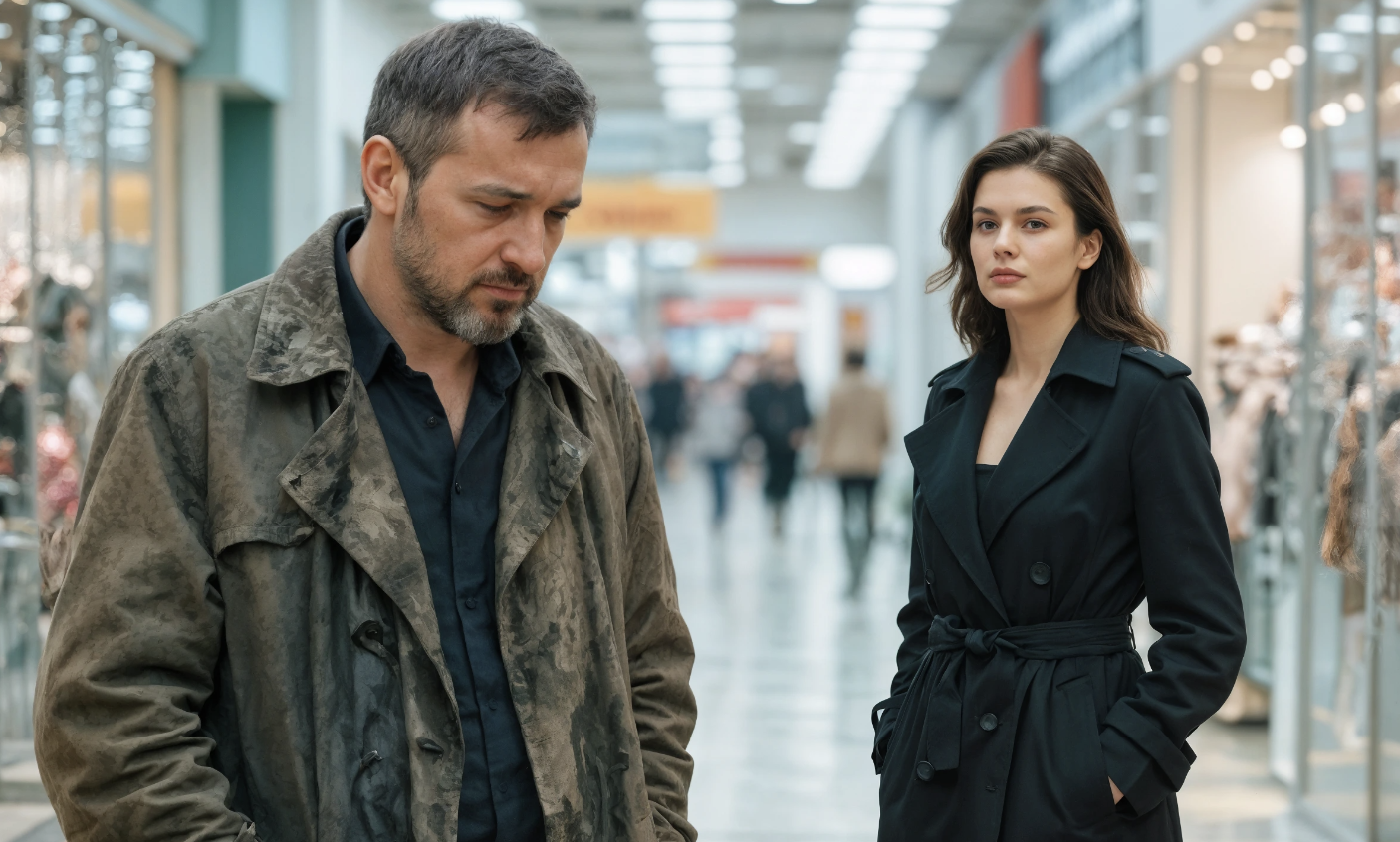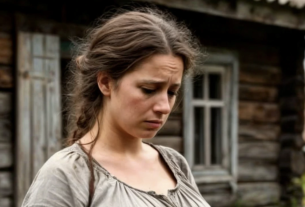Reflections of light played on the marble tiles of the shopping center, shimmering in the boutique windows and creating an illusion of celebration. The Sunday filled the vast space with the hum of voices and the sound of footsteps. In this crowd, she moved especially effortlessly—like water flowing around stones, easily and naturally finding her way between the hurried shoppers.
Her heels tapped out a confident rhythm on the marble floor. Her slender figure attracted attention. Hair gathered into a high updo revealed her neck and emphasized the delicate features of her face. She felt the gaze of men on her but paid them no mind—this feeling had long become a familiar, almost unnoticed background of everyday life.
She needed to buy a gift for a colleague and carefully examined the shop windows, thinking about what might please the person with whom she had spent the last three months working on a difficult case. A small victory to be celebrated—a new step up the endless ladder of her career, to which she had returned so unexpectedly and decisively.
She had almost made up her mind when she felt someone’s intense gaze on her. Not the kind of look men usually give an attractive woman—this was something different, deeper and more personal. Turning her head, she saw him.
He stood by a column, leaning his shoulder against it as if needing support. The expensive coat was clearly too large, as if borrowed from someone else’s shoulder. His tie was loosely tied, and his cheeks were covered with a week’s stubble. His posture, once proud and straight, now revealed fatigue and some inner brokenness. And yet, he was still… himself.
She didn’t recognize him immediately—time had passed between them, changing both of them far more than she could have imagined. Something flashed in his eyes she couldn’t quite define—surprise, recognition, and then… pain?
For a few moments, they looked at each other.
“Nadya?” His voice trembled, rising an octave, as if he himself couldn’t believe what was happening.
The world around them continued moving at its usual pace—people hurried on their errands, soft music played, and nearby children laughed.
“Sergey,” she said, her own voice sounding strangely calm. “What a surprise.”
He took a few steps toward her, and she noticed how his gait had changed—there was no longer the former ease and confidence in it.
“Is that really you?!” he said with genuine astonishment, and for a moment his eyes became moist. “I… I barely recognized you.”
On the day she decided to leave, the sky above the city was heavy and gloomy. Nadya packed methodically, without fuss, as if carrying out a long-planned action. Inside, it was empty and hollow, like an abandoned house.
“You do realize you’ll fall apart without me?” Sergey stood in the bedroom doorway, watching her pack with an expression of superiority on his face. “Who needs you? What are you capable of?”
She was silent, folding the essentials into her suitcase. After ten years of marriage, she had surprisingly few truly personal belongings. Most of her wardrobe had been chosen to please him or with her mother-in-law’s approval, and now those clothes felt foreign, belonging to someone else—the woman she had tried to be all those years.
“Aren’t you laughing at yourself? A cow who decided to become independent,” he smirked, and in that smile there was so much contempt that Nadya felt something inside her finally shatter with a crystal-clear ringing—the last fragile thread that bound them.
“You know, Seryozha,” she looked him straight in the eyes for the first time that evening, “you’re right. I really did become a cow. But the difference between us is that I can lose weight, and you…” she hesitated for a moment choosing her words, “you’ll stay like this forever.”
That was the first time he looked at her with surprise—as if he hadn’t expected that this obedient, convenient woman could have her own opinion, her own act, her own decision.
“Good luck,” he threw after her as she left the house. “Don’t forget to call when you realize what you’ve done.”
She didn’t look back. At that moment, Nadya didn’t yet know their next meeting would be a chance encounter in the shopping center three long years later.
Returning to the law firm where she had once started her career was not easy. For the first few days, Nadya felt like an alien accidentally placed among people—the office world seemed so strange and out of place after years of domestic confinement. Colleagues looked at her with curiosity and barely hidden sympathy. She heard whispers behind her back and understood their meaning: “That’s the one who won those cases, remember, and then gave up her career for marriage.”
She was given a desk in the far corner of the office and assigned routine paperwork. Every morning she woke up in her mother’s tiny apartment, made breakfast for two, and traveled across the city to spend the day preparing monotonous documents. In the evenings, after returning home, she studied the latest legal precedents for hours, trying to catch up on what she had missed during her years away from the profession.
Her mother watched her with worry and barely concealed “I told you so” looks. She had never approved of her daughter’s choice, believing Sergey to be unreliable and superficial. But now she was silent, understanding that Nadya needed time to gather herself from the shards into which her life had turned.
“Kovalchuk, come in,” the head of department’s voice interrupted the monotonous flow days after two months of her return. “There’s a case for you. I’ll be honest—it’s not easy. The client is problematic, chances minimal, no one wants to take it.”
She looked at the folder lying before her with a thin stack of documents and felt something inside ignite that resembled excitement—a feeling long forgotten but so familiar.
“What do you say? Will you take it?”
“Yes,” she answered without a second thought.
The following weeks turned into a marathon. She arrived at the office earlier than anyone and left last. She fell asleep over legal reference books and woke with new ideas. Her mother silently set a plate of dinner before her and removed it untouched. Colleagues shook their heads, certain of her inevitable failure.
But what no one expected happened—she won. Found a loophole in the law, connected seemingly unrelated facts, built the argument so that even the judge was impressed. The client, an older businessman, looked at her long after the verdict, then simply said:
“Thank you. You returned to me what I had long given up on.”
A week later, a sum she couldn’t even dream of was deposited into her bank account—a personal gratitude from someone who understood the value of professionalism. And a month later she was signing documents to buy a small studio apartment in a new district.
Her own roof over her head, her own space, her own life—all of this seemed like an incredible gift of fate. In the evening, standing in the middle of the empty apartment with a glass of wine, she smiled sincerely and freely for the first time in a long while.
Then came a call from an old friend:
“We’re going to the mountains for the weekend. Remember how you loved it? Come with us.”
And she went. The first climb was incredibly difficult—the body unused to physical exertion protested every muscle. But when she reached the summit and saw the panorama spreading beneath her feet, tears filled her eyes—she was home.
From that day, her life changed completely. She joined a gym, found a trainer, returned to climbing. Every weekend she went out of town—at first with a group, then alone. Nadya’s lungs filled with fresh air, and her soul with a forgotten sense of freedom.
Her body responded gratefully to care—extra pounds melted away, her skin took on a healthy glow, and a long-lost sparkle returned to her eyes. She became more attentive to her wardrobe, style, makeup—not for anyone else, but for herself.
With surprise, Nadya discovered she liked herself in the mirror again. And also—that men around her began to react differently: with interest, admiration, desire. But she didn’t rush to let anyone into her life, enjoying the newfound independence and freedom of choice.
“Maybe we could have coffee?” Sergey suggested, a strange mix of request and resignation in his voice—a tone quite unlike the old him. “There’s a decent café here.”
Nadya hesitated for just a moment. Curiosity—what had become of him? How had his life turned out?—overcame the instinctive desire to avoid the meeting, keep distance, not return to the past.
“All right,” she nodded. “I have half an hour.”
The café greeted them with muted light and the aroma of freshly ground beans. They took a table in the corner, away from the entrance. Nadya took off her light coat, carefully hung it over the chair back, and sat opposite her ex-husband, for the first time in a long time having the chance to look at him closely.
Sergey had aged. Not just grown older by three years—he seemed to have lived a decade. Deep wrinkles appeared at the corners of his eyes, his temples noticeably grayed, and the way he nervously fiddled with a napkin was completely unlike the confident man he had been.
“You… have changed,” he began, not taking his eyes off her face. “Simply incredible.”
“You too,” she answered calmly, not as reproach—just a statement of fact.
“How are you?”
What could she tell him? About returning to the profession? About her first apartment? About the mountains that had again become her passion? About how hard and exhilarating it was to relearn life—by her own rules, according to her own desires?
“Good,” she smiled. “I’m really good. And you?”
He looked away, staring into his cup as if trying to find the right words in the dark surface of the coffee.
“Not so well, honestly. Remember that big project I bet on? It failed. Had to sell the house.”
She listened, and a strange feeling overtook her—not schadenfreude, not satisfaction at another’s failure, but something like compassion. Without the pain that would have pierced her before—now it was a detached, calm empathy for a man to whom she was no longer connected by anything.
“Your mother…” she began cautiously.
“She lives with my sister outside Moscow. They get along, strangely enough,” he tried to smile, but it was a crooked smile. “I rent an apartment. Trying to start over, but… it’s harder than I thought.”
Nadya nodded. She understood better than anyone how hard it was to start from scratch, rebuilding life brick by brick.
“And your personal life?” she asked, surprised at her own boldness.
Sergey smiled bitterly.
“There was someone… at work. She left when things went bad. Turned out she was only interested in my position. And money.”
In his words, Nadya heard the echo of that old accusation—“Who needs you?”
“You know,” he suddenly leaned forward, and for a moment something of the old Sergey flashed in his eyes—determination, impulse, passion—“I often thought about you. About us. About how things could have been if I had then…”
“No,” Nadya stopped him gently. “That was long ago. We’ve both changed.”
“You’ve changed,” his voice trembled. “And I’m an idiot for not appreciating what I had. For not seeing who you really were.”
Tears glistened in his eyes, so unexpectedly, so unlike the Sergey she knew, that Nadya was momentarily confused.
“Is that really you?!” he said quietly, still not believing his eyes. “So beautiful, confident. I look at you and realize what an irreparable mistake I made.”
She was silent, looking at this life-broken man who had once been the center of her universe. Strangely, she felt no triumph or gloating—only a quiet sadness at the irrevocability of time and the inevitability of change.
“We could have…” he began uncertainly, reaching his hand across the table as if wanting to touch her.
“No, Seryozha,” she shook her head. “We couldn’t. What was between us is in the past.”
“But you see how I…”
“I see,” she gently interrupted him. “And I’m sorry. Truly. But each of us must follow our own path. I’ve found mine. And you will find yours.”
She looked at the clock—her half-hour break was ending. It was time to return to the life she had chosen—free and full of meaning.
“I have to go,” she said, standing up.
“You still have… the same number?” There was so much hope in his voice that for a moment Nadya felt sorry for him—truly, deeply sorry. But she understood: any contact would only be an attempt to cling to a past that could not be reclaimed.
“Sorry, I don’t think that’s a good idea,” she smiled at him—sincerely, without a hint of anger or resentment. “Good luck, Seryozha. Really.”
Leaving the café, she didn’t look back. The sunlight flooded the square in front of the shopping center, playing reflections on the car windows. Nadya took a deep breath of spring air and walked toward her car—confident, calm, with the light heart of a woman who had left the past behind and looked to the future with hope.



